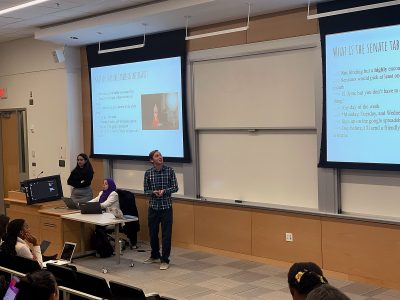
Following two weeks of talks surrounding the controversy of Ben Shapiro’s visit, Boston University Undergraduate Student Government reflected on the relationship between the three government branches as well as senators and their constituents in a meeting on Monday.
In her president’s address, Student Government President Hafzat Akanni addressed the email sent out last week stating the Executive Board would not be taking a definitive stance on Shapiro’s visit on Wednesday. Akanni noted that Senate’s response to the email brought up concerns from senators about the Executive Board’s role in Senate proceedings.
“You’re deciding what you want e-board’s role to be in the Senate,” Akanni said to senators. “We’re here to support you all.”
Members of the judicial and executive boards noted that they hold office hours, encouraging senators to attend to discuss student government matters and bridge division between the three branches.
“I’m excited that e-board, judicial, and senate for the most part agree that we want to maintain a united, cohesive student government,” said Senator Shaina Evans, a sophomore in the College of Arts and Sciences. “After the last two weeks with Ben Shapiro, it kind of was divisive in a lot of ways just because he’s so controversial, but I think that was a real test for us as a student government because we came through on the other side.”
Evan Teplensky, a freshman senator from CAS, presented his Senate Tabling Initiative, which encouraged senators to table in the George Sherman Union or another public space on campus at least once per month.
Teplensky cited the controversy surrounding Ben Shapiro’s visit to campus as the inspiration for the initiative, saying he believes the conflict highlighted a need for increased communication between Senators and their constituents.
Senator Frank Mata, a junior in CAS, said he supports the initiative as a way for senators to better perform their duties.
“That’s what we’re here for, we’re here to do work for our constituents,” said Mata. “I’m hoping that that it’s an initiative that goes on not just in a month or two, but for the rest of the year and many years to come.”
Teplensky said he encourages students to approach senators during their tabling hours with comments and concerns.
“We were elected and appointed by the people, so any issue that they have that they see going wrong with Boston University, they should definitely come up and talk to us,” Teplensky said. “That’s the whole idea of this.”
The Water Quality Act Committee presented the initial findings of their campus-wide water quality tests. Initial trends indicated that water across the BU campus dorms and classroom buildings is safe, with only mild variations in lead, chlorine, and copper levels in some locations.
The committee plans to conduct a statistical analysis of the collected water samples to develop conclusive results. Committee chair Aditya Jain said he hopes to release the final results of the tests to the BU community in 1-2 weeks.
Water Quality Act Committee member Jenna Saointz, a junior in the College of Engineering, said she met with the Boston University plumbing manager Bill Murray last Monday to discuss water quality and pipe maintenance.
Saointz said BU does not conduct its own water quality tests, but the water supply at BU is tested by the Boston Water and Sewage Commission before it reaches the university. She also said the plumbing in every dorm building on BU’s campus has been redone in the past twenty years, regardless of renovations to the buildings themselves.
Senate also voted on and passed funding requests from the chairs of the Mental Health and FEAST committees on Monday. Each committee provided a breakdown of how they would allocate their requested budget.
Senate granted the Mental Health Committee and FEAST Committee $1,200 and $800, respectively, leaving a student government budget of roughly $17,600.
Vice President of Finance Lukas Flores noted that he would support more in-depth breakdowns of budget allocation, as well as requests for funding closer to the time of the event requiring funding.
“I get the general feeling that maybe you’re not 100 percent sure how you want to spend your money yet and you’re just securing your money at this point,” Flores said. “If Senate thinks that’s fine and that’s how you want to do it, that’s not my place to say.”




